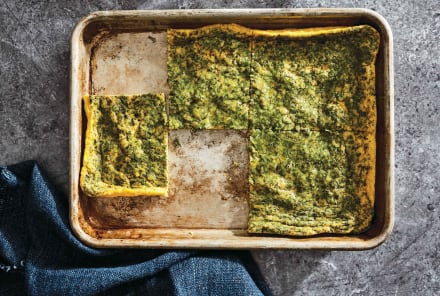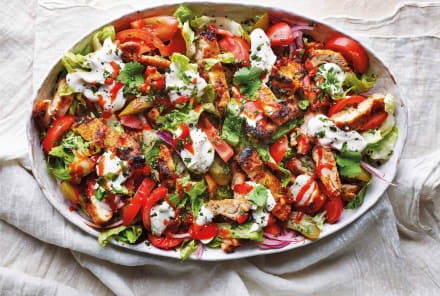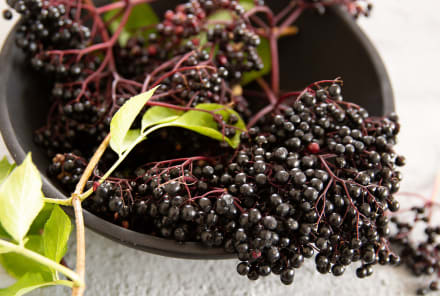Advertisement
Following A Mediterranean Diet May Reduce Chronic Pain, Study Finds


Life with chronic pain can feel hopeless and debilitating. And while no two pain experiences are the same, there are a few practices that have helped many people feel like themselves again. Practicing gentle movement, easing the strain on your adrenal glands by reducing stress, and taking targeted supplements for pain relief and joint comfort can all be effective.
Research is increasingly finding that adjusting your diet may also help take the edge off. According to a recent literature review, there is now sufficient evidence that a Mediterranean-style diet, in particular, may play a role in reducing inflammation and musculoskeletal pain.
Here's what the Mediterranean-style diet really entails, what makes it effective, and how to get started with it.
What is it about Mediterranean eating that helps with pain?
This new narrative review1, published in the journal Pain Physician, analyzed 32 original research articles to determine which eating patterns show the most promise for pain relief. They found the strongest evidence for the Mediterranean diet, as well as vegetarian and vegan meal plans.
As a refresher, the Mediterranean diet loosely replicates how people in countries around the Mediterranean Sea, like Spain, Greece, and Italy, tend to eat. It consists of plenty of fruits, vegetables, fish, whole grains, nuts, seeds, and olive oil, as well as some dairy and meat. There are a few elements of this diet that may help ease chronic pain, including:
- It's high in omega-3-rich seafood: Those who live on the Mediterranean traditionally subsided on catches of the day such as fatty sardines, fresh tuna, and flavorful anchovies. All these fish are packed with heart-healthy omega-3 polyunsaturated fatty acids (PUFAs). These omega-3s have anti-inflammatory properties2, which could be beneficial in the context of pain management. In particular, they've been shown to relieve pain and improve joint function in patients with osteoarthritis in recent research3.
- It's high in antioxidant-rich fruits and vegetables: The antioxidants you'll find in fruits and vegetables—which are also prominent on the Meditteranean plate—can lower oxidative stress, protect tissues from damage, and help reduce inflammation. For this reason, a diet high in antioxidants may also help reduce pain, as shown in research with people who suffer from fibromyalgia4 and pancreatitis5. This may also help explain why vegetarian and vegan diets were found to be effective for pain management in the Pain Physician review.
- It's low in processed foods: A strict Mediterranean diet limits processed foods containing seed oils and added sugars—both of which can trigger inflammation (and, by extension, pain) when consumed in excess. These are replaced by less inflammatory snacks like pita, hummus, nuts, low-sugar nut butters, etc.
In addition to the Mediterranean diet, researchers found evidence that diets containing turmeric—a potent anti-inflammatory spice6—may also help reduce pain. They found poor-quality or insufficient evidence that adding olive oil, ginger, or herbal teas to your routine can reduce pain (though that doesn't mean these won't come with other health perks).
Other benefits of eating like you're on a Mediterranean vacation
The authors of the Pain Physician review call for more research on the link between diet, inflammatory markers, and disease states before we can conclusively say that any one way of eating is better than another for pain management. However, the Mediterranean diet is considered one of the world's healthiest for a reason. Here are a few other ways that it seems to support whole-body health:
- Participants with the highest adherence to the Mediterranean diet have been shown to have a 29% lower risk of gastric cancer on average, according to this 2023 systematic review.
- Those who followed a Mediterranean diet had a 23% lower risk of developing dementia than those who did not those not, according to research published this year.
- Those who followed the Mediterranean diet most closely were 57% less likely to have breast cancer than those who followed it the least closely, according to this recent Frontiers in Nutrition study.
- Diets higher in fiber, fruits, vegetables, and anti-inflammatory nutrients and lower in saturated fat, like the Mediterranean diet, have consistently been associated with better sleep quality, which can go on to support overall mood, energy, and more.
One nice thing about the Mediterranean diet is that it's a pretty flexible eating plan that is welcoming of many foods and only restrictive of a couple.
The takeaway
A recent scientific review found that following a Mediterranean diet may help reduce chronic musculoskeletal pain. If you're ready to eat like you're in southern Greece in the name of pain relief and overall health, here's our 101 guide to starting the Mediterranean diet, complete with a 7-day meal plan. And if you're not much of a cook, check out these delivery services that bring Mediterranean-style meals to your doorstep.
Watch Next
Enjoy some of our favorite clips from classes
Enjoy some of our favorite clips from classes
What Is Meditation?
Mindfulness/Spirituality | Light Watkins
Box Breathing
Mindfulness/Spirituality | Gwen Dittmar
What Breathwork Can Address
Mindfulness/Spirituality | Gwen Dittmar
The 8 Limbs of Yoga - What is Asana?
Yoga | Caley Alyssa
Two Standing Postures to Open Up Tight Hips
Yoga | Caley Alyssa
How Plants Can Optimize Athletic Performance
Nutrition | Rich Roll
What to Eat Before a Workout
Nutrition | Rich Roll
How Ayurveda Helps Us Navigate Modern Life
Nutrition | Sahara Rose
Messages About Love & Relationships
Love & Relationships | Esther Perel
Love Languages
Love & Relationships | Esther Perel
What Is Meditation?
Box Breathing
What Breathwork Can Address
The 8 Limbs of Yoga - What is Asana?
Two Standing Postures to Open Up Tight Hips
How Plants Can Optimize Athletic Performance
What to Eat Before a Workout
How Ayurveda Helps Us Navigate Modern Life
Messages About Love & Relationships
Love Languages
Advertisement

How To Use Food To Recover From Autoimmunity: An MD's Top 4 Tips
Sara Szal Gottfried, M.D.










